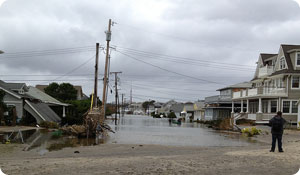
Manmade and natural disasters certainly test our resilience. In just the last decade or so, we've experienced terrorist attacks, major hurricanes, wars, and now, superstorm Sandy.
Relief efforts for Sandy are in the early stages, and professionals and volunteers are focusing on restoring basic services and fulfilling victims' needs for food, safety, and medical care. However, the immediate and long-term psychological effects of traumatic events can be significant. For example, mental health issues became a leading cause of disability for survivors following hurricane Katrina.
In an NPR interview following superstorm Sandy, psychiatry professor Carl Bell, MD, said people who are already mentally ill, or those who've been previously harmed or traumatized, are often more anxious and more vulnerable for post-disaster psychological problems. On the other hand, he points out, these individuals may actually be more resilient because they're a little better prepared for bad things to happen.
Stress Disorders
Post Traumatic Stress Disorder (PTSD) does not just affect war veterans. Anyone can develop anxiety disorders after a severe emotional or physical experience, such as a devastating storm. Children, in particular, are especially vulnerable.
Individuals with PTSD or Serious Emotional Disturbance (SED) continue to feel frightened or uneasy in situations that present no danger, and they may experience flashbacks, reliving the traumatic situation. Dr. Bells says the less people have a sense of self-efficacy, a sense of can do, the more they are at risk for PTSD.
Dealing With Stress Following Disaster
- Recognize signs of distress: difficulty making decisions or staying focused, feeling physically and mentally drained, being easily frustrated, changes in appetite or sleep, feeling sad or distraught, or arguing with others. Fortunately, says the American Red Cross (ARC), most of these symptoms will go away over time.
- Take care of yourself by eating well, drinking plenty of water, getting enough sleep, and seeking proper medical care.
- Try to do something constructive and make a difference; you'll cope better psychologically.
- Put off making major decisions for now. Set priorities and look for ways to take one step at a time.
- Limit your exposure to the sights and sounds of disaster as much as possible.
- Be patient with yourself and others.
- Turn to existing resources for help. The ARC and the National Child Traumatic Stress Center, for example, offer emotional recovery resources on their websites.
If you're a parent or teacher, research shows children do best when important adults appear calm, answer questions honestly, have a spirit of hope, and give children the sense they can keep them safe.
Sources:
University of North Carolina. "Hurricane Katrina." Web. 2 December 2010.
http://hurricanekatrina.web.unc.edu/psychological-effects-of-katrina/
Chen, Pauline W., M.D. "Easing the Trauma After the Storm." New York Times Blog. Web. 2 November 2012.
http://well.blogs.nytimes.com/2012/11/02/the-trauma-after-the-storm/
NPR. "The Psychological Damage From Superstorm Sandy." Web. 30 October 2012.
http://www.npr.org/2012/10/30/163950601/the-psychological-damage-from-superstorm-sandy
National Child Traumatic Stress Center. "Hurricanes." Web.
http://nctsn.org/trauma-types/natural-disasters/hurricanes#q1
American Red Cross. "Recovering Emotionally." Web.
http://www.redcross.org/find-help/disaster-recovery/recovering-emotionally





